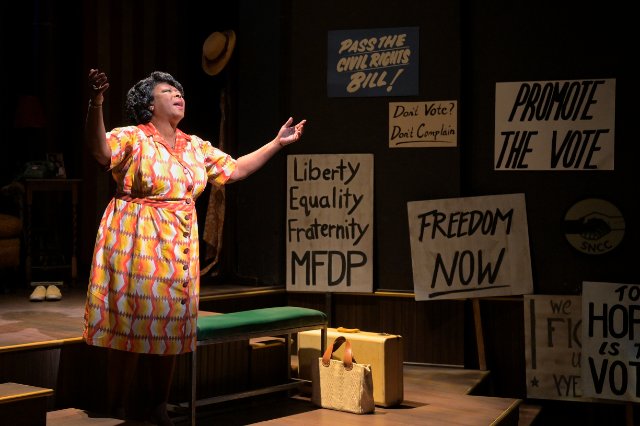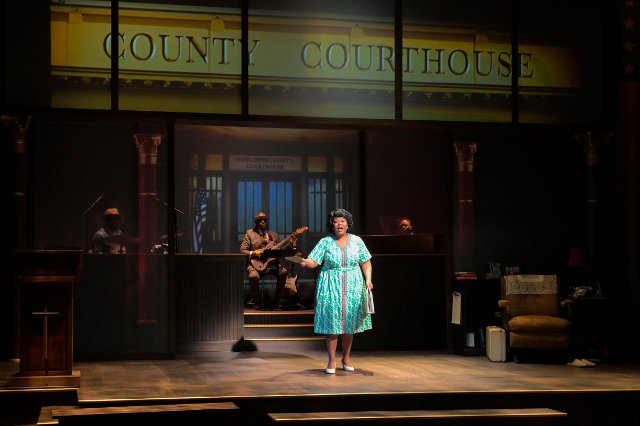Fannie: The Music and Life of Fannie Lou Hamer
An Homage to a Civil Rights Heroine
By: Victor Cordell - Mar 13, 2023
The side walls of the Lucie Stern Theatre are bedecked with simple posters reflective of 1962, when the push for the Civil Rights Act began. “We Demand the Right to Vote.” “No to Jim Crow.” “Pass the Civil Rights Bill.” And many more. Screen projections and audio on stage highlight the key players and incidents from the movement to secure voting rights for African Americans.
Several years ago, this play could be seen as history – a poignant reminder of the many tragedies and the ultimate triumph of good over evil – an admission of our reviled former days. Regrettably, this country suffers a redux of our hateful and sinful past, if without the preponderance of violence and extreme intimidation for wanting the vote. However, violence is still visited upon Blacks in other ways and for other reasons.
The political right wing in the United States threatens the very existence of democracy as political operatives boldly and cruelly crush the goodness out of progress and what made this nation great. The U.S. Supreme Court has undermined the Civil Rights Act of 1965, and conservative (read Republican) local political authorities, judges, state legislatures, and their colleagues in the U.S. Congress brazenly introduce laws and administrative procedures with the evil intent of depriving people who are not in their clan the right to vote by using lies, deceit, and Machiavellian ploys. As startling as the following question may be – how do these actions differ from fascism? And why aren’t its enemies not fielding a stronger defense against this perversion? So, ultimately, this is to say that “Fannie: The Music and Life of Fannie Lou Hamer” should not be viewed as a simple history lesson, but as a cautionary analogue to what is happening at this very time.
Greta Oglesby gloriously reprises the role of Fannie Lou Hamer that she performed at Oregon Shakes’ vast outdoor Elizabethan Theatre. She brings a speaking voice brimming with passion and conviction, as well as a strong and melodious singing voice. She stalks the stage with a slight hobble as a wounded warrior who is too busy planning the next demonstration to let her nagging injuries slow her down.
So, who was Fannie Lou Hamer? A minimally educated, but intelligent, articulate, and committed Mississippi woman – she is one of those whose contributions are not recognized in the same breath as activist leaders of the day. Yet, she organized the pivotal Mississippi’s Freedom Summer and co-founded the National Women’s Political Caucus. Perhaps her story has not rung forth simply because she is a woman, much like Dolores Huerta’s light as a leader of the United Farm Workers’ of America was totally overshadowed by co-founder Cesar Chavez until recently.
Playwright Cheryl L. West has crafted a 70-minute summary of Hamer’s work, shining light on this much overlooked lioness. Mixing vignettes of great gravity with occasional lighter touches, the playwright keeps the action moving along, and Director Tim Bond creates a kinetic and visual environment to prevent the one-woman show from going stale.
Fighting through poverty, even through the years of her activism, Oglesby depicts Hamer’s indomitable spirit in a series of stories mostly from the 1960’s. In one harrowing sequence in jail, she is beaten almost to death involuntarily at the hands of a Black male prisoner, so demanded by a White jailer. Hamer would suffer permanent kidney damage along with other lasting ailments. She vowed, however, that if she could survive that beating, she would be intimidated by nothing. She continued to register people to vote and fight literacy tests, poll taxes, and lying intimidation to accomplish equal voting rights. Along the way, she would objectively acknowledge the truths that she confronted. Not to generalize, but some white women advanced their own voting rights at the expense of rights of Black women to vote, so that the suffrage movement actually set back progress for Black women. At the same time, some white men and youth were instrumental in helping to move the needle toward universal suffrage.
The structure of the play is a key element in the entertainment. Throughout, Hamer sings snippets of songs of protest to enliven the stories, and she does so with great verve in a number of styles from ballad to rousing revival meeting gospel with sing-along, inducing audience involvement. Some lyrics are organic and cleverly carry the narrative of the story, while others are old standards like “This Little Light of Mine” and “We Shall Not Be Moved.” Missing is the civil rights anthem “We Shall Overcome,” which may have been omitted because it would seem too cliché. This device of integrating music into dialog, which she did at her meetings, adds much liveliness to what could be a wholly depressing chronicle.
“Fannie: The Music and Life of Fannie Lou Hamer,” is a fitting tribute to a courageous and accomplished woman. While its messages are important, unfortunately, they largely reach the already converted. In these days, many people do not seek the truth but rather reinforcement of what they already believe. So those who don’t want to acknowledge the flaws in American history are unlikely to seek exposure to a presentation like this. As a footnote, Hamer’s prescient warning echoes that just because White resisters to the progress of Blacks are not wearing hoods doesn’t mean that they’re not trying to destroy the Black community. The battle is far from won.
“Fannie: The Music and Life of Fannie Lou Hamer,” is written by Cheryl L. West, produced by TheatreWorks Silicon Valley, and is performed at Lucie Stern Theatre, 1305 Middlefield Road, Palo Alto, CA through April 2, 2023.


